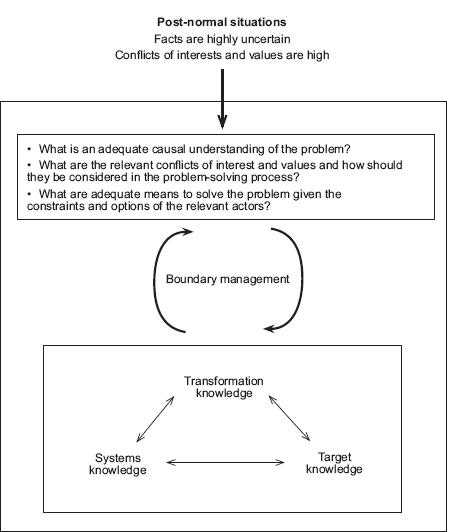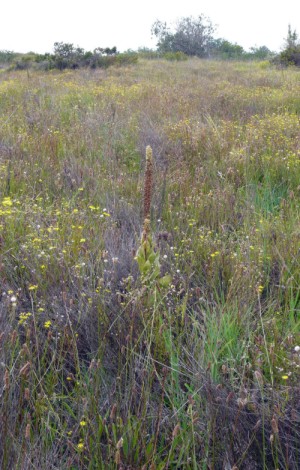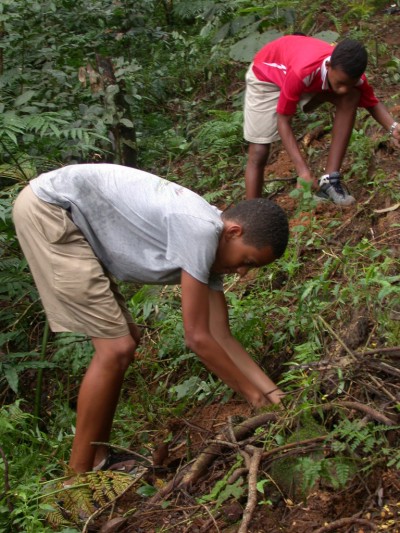2 A theoretical framework for the analysis of the effectiveness of problem-oriented research
Expertise on effective problem-oriented research has developed over the past decades under a broad number of keywords, including transdisciplinary research (e.g. Hirsch Hadorn, 2003; Pohl and Hirsch Hadorn, 2007*), integration and implementation sciences (Bammer, 2005*), Mode 2 knowledge production (Nowotny et al., 2001), post-normal science (Funtowicz and Ravetz, 1993*), socio-ecological research (Becker, 2002; Becker and Jahn, 2006*), and effective knowledge systems (Cash et al., 2003*). While some of these scholars have attempted to developed novel scientific concepts for particular thematic research fields, e.g. sustainable development (Brand, 2000), others have worked on a general methodology for effective problem-oriented research (cf. Kueffer et al., 2007a) or have proposed quality criteria for evaluating transdisciplinary research projects (Bergmann et al., 2005). It has been suggested that there is a high potential to generalise such methodological insights across research fields (Bammer, 2005). But so far most theoretical thinking has focused on adapting research on the level of individual research projects or programmes (Hirsch Hadorn et al., 2008), while the methodological implications of attempting effective science on the level of a whole research field have rarely been considered. We propose in the following a framework, derived from design principles for transdisciplinary research projects compiled by Pohl and Hirsch Hadorn (2007*), that facilitates the analysis of the problem-orientation of research fields, and helps to design effective problem-oriented research.A major challenge of much environmental problem solving is that often facts are highly uncertain, and conflicts of interests and values are prominent in the problem-solving context (post-normal situations sensu Funtowicz and Ravetz (1993*)). In such post-normal situations facts and values are closely entangled – for instance scientific advice may be deliberately produced to support the views of particular stakeholders (Pielke Jr, 2002), and the effectiveness of science depends on the capacity of the existing institutions to implement the proposed measures (Pohl and Hirsch Hadorn, 2007*). Therefore the effectiveness of problem solving strategies depends simultaneously on three factors: a scientifically adequate understanding of the causal relations relevant to the problem (credibility), an adequate treatment of stakeholders’ interests and values during the research and problem-solving process (legitimacy), and an adequate design of problem-solving practices that take into consideration the constraints and options of the implementing actors (relevance) (Bocking, 2004; Cash et al., 2003*; Pohl and Hirsch Hadorn, 2007*). Consequently, problem-solving is confronted with three types of questions (Figure 1*): what is an adequate causal understanding of the problem? What are the relevant conflicts of interest and values and how should they be considered in the problem-solving process? What are adequate means to solve the problem given the constraints and options of the relevant actors?
Importantly, these three challenges are interrelated and value-laden (Cash et al., 2003*; Funtowicz and Ravetz, 1993; Pohl and Hirsch Hadorn, 2007*). A certain causal understanding of a problem may favour some problem solving means over others, and this may in turn serve some stakeholders better than others. For instance, the development of responses to climate change may be based on a problem understanding that focuses on the reduction of anthropogenic CO2 output, the control of the air CO2 level, or mitigations of the consequences of a changing climate. The corresponding problem-solving practices may, respectively, be an investment in public transport systems, the planting of forests as CO2 sinks, or the construction of sea walls at sea shores. Different stakeholders will favour different solutions and therefore different problem framings.
Given the three challenges introduced above, it can be expected that science may assist problem-solving in three ways by, respectively, analysing casual relationships, clarifying conflicts of interests and values, or contributing to the development of appropriate means for action. These three basic types of scientific contributions have been termed systems, target and transformation knowledge (Figure 1*) (Pohl and Hirsch Hadorn, 2007*; ProClim, 1997). Systems knowledge assists in reducing the uncertainties regarding the understanding of the causal relationships relevant for the genesis and possible further development of a problem (Figure 2*). Systems knowledge confronts the difficulty of dealing with the complexity of concrete real-world cases, such as complex society-nature-interactions (e.g. Becker and Jahn, 2006), based on abstract insights from a laboratory, a model or a theory. Target knowledge assists in clarifying conflicts of interests and values entangled within the problem solving process (Figure 3*). The determination of the relevant stakeholders, conflicts of interests and values is related to issues of empowerment and inclusion/exclusion of stakeholders and experts, and therefore needs transparency and reflexivity (Elzinga, 2008*). Transformation knowledge assists in developing problem solving means that take existing practices and institutions into consideration and help adapt them to the problem (Figure 4*). Systems, target and transformation knowledge are interrelated.
It is important to note that there is no evident link between the three challenges in societal problem-solving and the three knowledge forms – rather this link has to be clarified recurrently through joint problem structuring among different experts and stakeholders. Such deliberations at the boundary between science and management, that are typical for post-normal situations, may be called “boundary management” (Figure 1*) (Cash et al., 2003*; Hellström and Jacob, 2003*). There are structured research processes such as transdisciplinary research (Pohl and Hirsch Hadorn, 2007*) and institutional forms such as boundary organisations (Hellström and Jacob, 2003*) that facilitate boundary management, but often boundary management is not conducted in an explicit and structured way. Boundary management ensures that the relevant academic and non-academic expert and stakeholder perspectives are adequately represented in the research and problem-solving process (Hellström and Jacob, 2003*; Pohl and Hirsch Hadorn, 2007*), and that the framing of research questions is adequate for supporting the decisions of actors (Hirsch, 1993, 1995). The process is called boundary management because the boundaries between different forms of academic and non-academic expertise and between facts and opinions (interests and values) are reconfigured. Because boundary management is itself based on (tentative) scientific expertise, boundary management and research on specific questions have to alternate in recursive cycles (Pohl and Hirsch Hadorn, 2007*), and effective problem-oriented research encompasses both research on specific questions and boundary management.
In summary, in this paragraph we attempted to decompose the complexity of science-based problem solving in post-normal situations into a number of different processes (Figure 1*). In particular, we argue that it is helpful to consider three types of scientific advice – systems, target and transformation knowledge – but that adequate research questions on the three types of knowledge can only be identified through explicit deliberation among experts and stakeholders (boundary management). Although this is necessarily a simplification, we think that it is helpful to analyse the problem-orientation of whole research fields. In the following we describe research on biotic invasions according to the following questions: what systems, target and transformation knowledge is produced? How is this systems, target and transformation knowledge interrelated? What mechanisms are in place to ensure boundary management?








